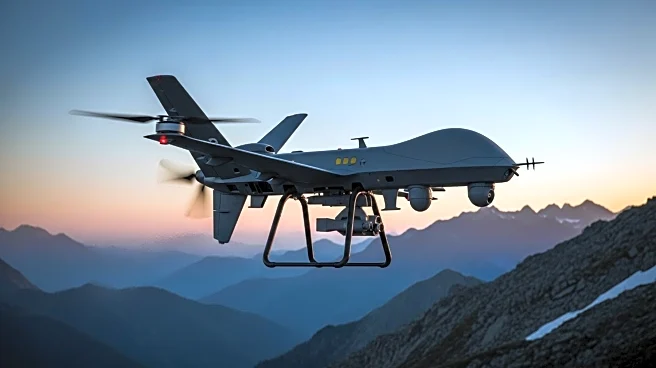What's Happening?
President Trump has announced that the United States is attempting to reclaim Bagram Airbase in Afghanistan, which was abandoned by American troops in 2021 during the withdrawal from the country. Bagram Airbase was the largest American military base in Afghanistan and served as a logistics hub for the 20-year international war effort. Trump has criticized former President Joe Biden for the decision to hand over the airfield, emphasizing its strategic importance. The announcement comes amid ongoing discussions about U.S. military presence and strategy in the region.
Why It's Important?
The effort to reclaim Bagram Airbase highlights the ongoing debate over U.S. military strategy in Afghanistan and the broader Middle East. Reclaiming the base could signal a shift in U.S. foreign policy, potentially increasing military presence in the region. This move may impact international relations, particularly with Afghanistan and neighboring countries, and could influence the geopolitical balance in the area. The decision also reflects President Trump's continued criticism of the Biden administration's handling of the withdrawal from Afghanistan, which has been a contentious issue in U.S. politics.
What's Next?
If successful, reclaiming Bagram Airbase could lead to increased U.S. military operations in Afghanistan, affecting regional security dynamics. The move may prompt reactions from Afghan authorities and neighboring countries, potentially leading to diplomatic negotiations or tensions. Additionally, the decision could influence U.S. domestic politics, as it may become a focal point in discussions about military strategy and foreign policy. Stakeholders, including military leaders and policymakers, will likely assess the implications of this action on U.S. interests and regional stability.
Beyond the Headlines
Reclaiming Bagram Airbase could have long-term implications for U.S. military strategy and foreign policy in the Middle East. It may affect the U.S.'s ability to project power and influence in the region, impacting counterterrorism efforts and alliances. The decision also raises ethical and strategic questions about the U.S.'s role in Afghanistan and its commitment to regional stability. Additionally, it may influence public opinion on military interventions and the use of military bases abroad.










